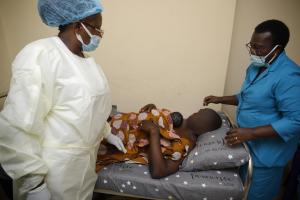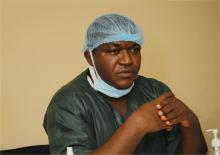More Nigerians are embracing skin-to-skin care to reduce hypothermia in newborns
Abuja, May 26, 2020 - At Kwali General Hospital Abuja post-natal ward lies Abdul Shuaibu, a 34year old civil servant holding his newly born baby - his second child, on his chest. This is becoming a familiar sight at the hospital in recent times. He was observing the 60-minute skin to skin Kangaroo Mother Care (KMC) usually done by mothers.
KMC is a method of care for pre-term and/or low birth weight infants, the method involves infants being carried, usually by the mother, with skin-to-skin contact. However, in the facilities implementing QoC on the WHO QED network in Nigeria, the skin to skin care is used for all stable babies (irrespective of their weight) to reduce hypothermia, for early initiation of breastfeeding and improve bonding.
The Kwali General Hospital piloted the male involvement in KMC, especially designed for newborn babies delivered by cesarean section (CS).
Mr Shuaibu stated that he wished that he had done same for his first child as he is now more fulfilled and feels more involved in taking care of his baby and enthused that, “I feel more connected to this child, and I feel so in love and contented, I now feel like a responsible father.”
Sharing his experience, another father, Mr Nathaniel Agbo said that “this is not just for emotional effect, if not for it, I could have lost my baby due to cold. It is a lifesaver and benefits outweigh the inconveniences. It doesn’t matter if it is done by the mother or me.”
The KMC is one of the interventions supported WHO to elevate the Quality of Care (QoC) initiative in the facility to reduce hypothermia (low body temperature) with the aim of reducing newborn deaths in Nigeria. Both Mr Shuaibu and Mr Agbo have joined other men who have left the traditional roles of men in care of newborn to embrace provision of more support to the mothers. Skin-to-skin contact for at least the first hour of life is one of the quality improvement interventions of General Hospital Kwali which has been on the WHO Quality, Equity and Dignity (QED) network for QoC since 2019. Since the start of the intervention the facility, all stable babies born receive skin to skin contact thereby eliminating hypothermia (low body temperature).
“With new scientific evidence and trainings provided we tried to improve quality of care provided and through that, have improved our approach and we have seen a lot of good results. The babies become healthier, it brings more bonding between the fathers and the newborns and makes the fathers more responsible, it also contributes to reduction of neonatal death” stated Dr Ahmed Sa’id, a Senior medical officer and head of obstetrics and gynecology department, Kwali General Hospital, Abuja.
“To convince the fathers to partake in the process, we talk to both parents and explain to them the benefits and it is with great joy that a lot of fathers are now eager to participate in the kangaroo care. Even though cultural beliefs do play a role in resistance from the men, seeing the results make them understand and accept to do it and at the end of the day they become grateful. So far, we have recorded over 70 percent of compliance in the fathers and the numbers keep increasing by the day.”
To improve quality of care across Nigeria, WHO has been coaching healthcare workers in the labor room, wards and antenatal areas on how to beef up their practices to help reduce maternal and child mortality. So far, WHO has trained over 500 workers in 19 health across FCT, Abuja and Kebbi state in Northwest Nigeria, a region with one of the highest rates of newborn mortality in Nigeria. Maternal, newborn and child health quality of care is also being implemented across 10 other states in Nigeria with support from other partners.
Nigeria is the country with second highest death of newborns in the world, next to India, with 270,000 deaths in 2019. Globally 2.4 million children died in the first month of life in 2019. There are approximately 6 700 newborn deaths every day, amounting to 47% of all child deaths under the age of 5-years, up from 40% in 1990.
To address the challenge, Dr. Olumuyiwa Ojo, Technical officer with WHO said, “This has been an interesting journey for us at WHO Nigeria, we have noted how the quality improvement trainings and monthly coaching, have led to health workers developing local, low cost solutions to improve quality of care, increase patient satisfaction and prevent avoidable deaths. We are strengthening coordination and strategic scale up of these interventions across Nigeria, with government’s leadership and collaboration with various partners.”
Nigeria is one of the first wave countries who subscribed to the WHO-led QED network with support from Bill and Melinda Gates Foundation, EU, USAID and other donors who directly support partners on the network. The aims of the network are to reduce by half, maternal mortality, still births and improve experience of care as reported by mothers and the families. This is an evidence-based process of increasing trust in the healthcare and promoting uptake of clinical care.
Technical Contacts:
Dr Kofi Boateng; Email: boatengko [at] who.int (boatengko[at]who[dot]int); Tel: +234 706 449 1772
Dr. Olumuyiwa Ojo; Email: ojool [at] who.int (ojool[at]who[dot]int); Tel: +234 706 625 4989




